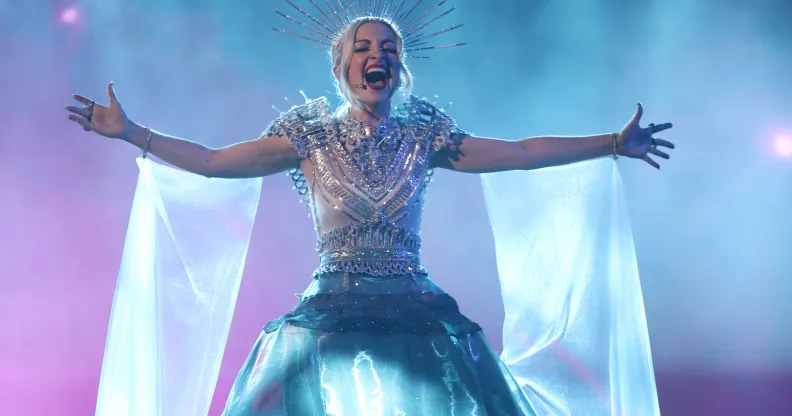Australia will be in the Eurovision Song Contest for another five years

Kate Miller-Heidke will represent Australia at this year’s Eurovision Song Contest (Chris Hyde/Getty)
Australia has agreed to compete in the Eurovision Song Contest for five more years.
The country, which will be represented at the 2019 event in Tel Aviv, Israel, by Kate Miller-Heidke and her song “Zero Gravity,” is now set to grace the Eurovision stage until at least 2023, according to Eurovision.
Since Australia’s Eurovision debut in 2015, it has been an annual question of whether it would return the next year—but this step makes the country a semi-permanent member of the competition.

Australia has three top-10 positions in four years at Eurovision. (Chris Hyde/Getty)
Jon Ola Sand, the European Broadcasting Union’s executive supervisor, said the organisation was “delighted that Australia has become a more permanent member of the Eurovision Song Contest family.
“The Australians have long been huge fans of the event with a great number of loyal viewers year on year and when they were invited to participate in the 60th anniversary edition of the Contest, we couldn’t have imagined quite how popular their artists would become.”
“It was a natural progression for us to agree to their inclusion as a participant for the next five years,” he added.
Australia welcomes new Eurovision status
Josh Martin, the commissioning editor for Australian Eurovision broadcaster SBS, said the company was “thrilled at this invitation to become a more permanent member of the Eurovision Song Contest family.
“We will continue to showcase Australia’s amazing talent and diversity to hundreds of millions of people across Europe and the world.
“It highlights the power of music to bring people together—even from polar opposite sides of the globe. Thank you Europe!”
Paul Clarke, who leads the Australian delegation to Eurovision, said it was “a wonderful validation of what Australia has brought to Eurovision, and we say: ‘Thank You Europe!’ for their decision.”
“Europe knows it can always expect great music and passion from Australia.”
— Paul Clarke, who leads the Australian delegation to Eurovision
He added that “Australians have really fallen in love with the joy, and Eurovision has become part of the Australian entertainment calendar. Europe knows it can always expect great music and passion from Australia.”
The country also held its first-ever televised national selection, Eurovision–Australia Decides, earlier this month.
Competitors included former RuPaul’s Drag Race contestant Courtney Act, who impressed viewers with her upbeat performance of “Fight For Love.”
However, Act, whose real name is Shane Jenek, was beaten Miller-Heidke, angering fans who were desperate to see the drag queen perform in Tel Aviv.
Australia has had a successful time at Eurovision during its brief time in the competition, securing top 10 positions in its first three years. It even came second in 2016 with Dami Im’s “Sound of Silence.”
However, the country came 20th out of 26 countries in 2018, and was only saved from the bottom of the table by the jury’s vote.

